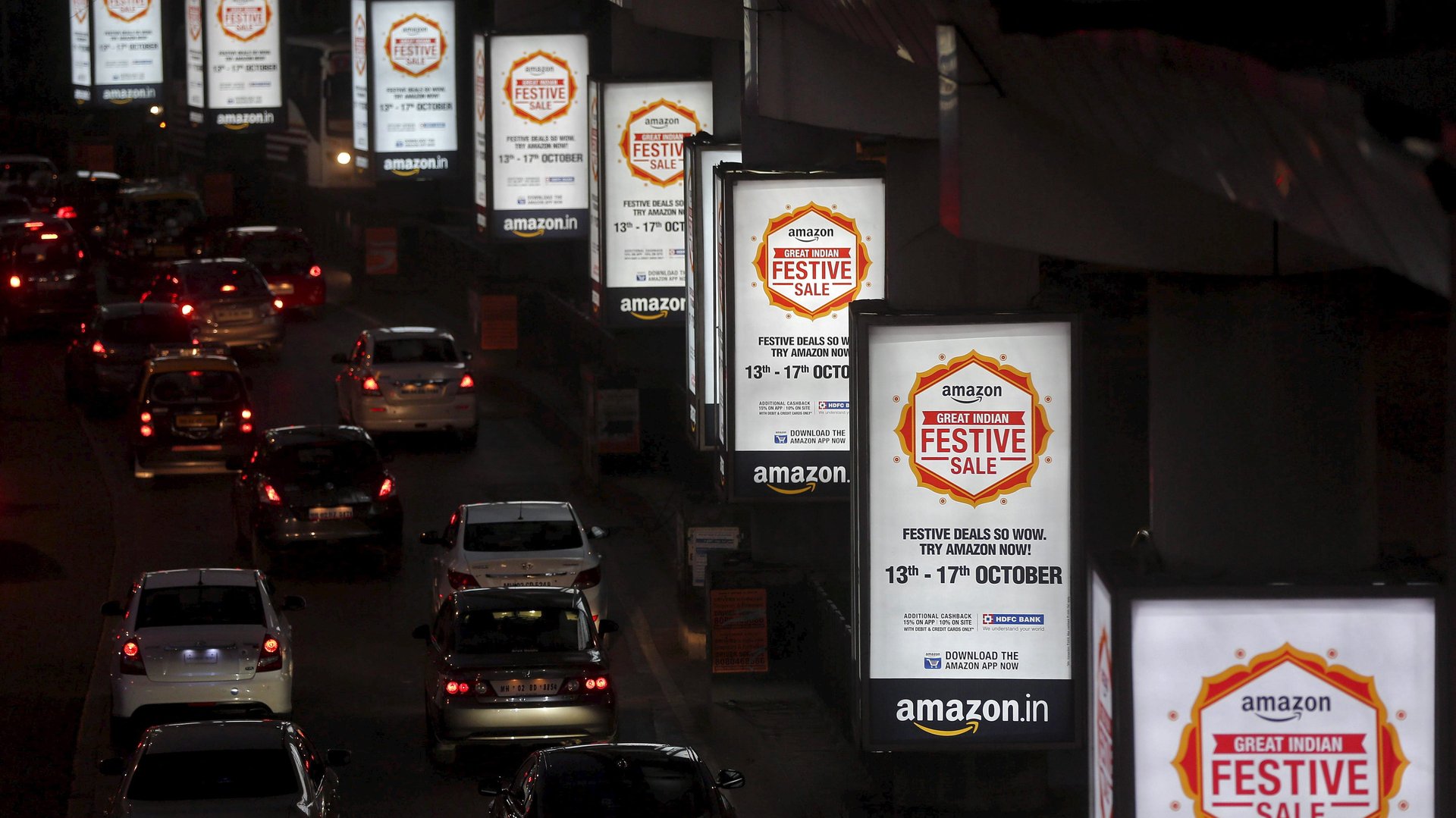This Diwali, Flipkart and Amazon India have to please buyers, angry sellers and the competition regulator
Amazon and Flipkart may have to turn some of their lights out this Diwali.


Amazon and Flipkart may have to turn some of their lights out this Diwali.
Over the years, India’s online festive sales have only become bigger and more frequent. Even before Amazon’s Great Indian Festival sale and rival Flipkart’s Big Billion Days sale, between Sept. 29 and Oct. 04, the e-commerce behemoths were already engaged in multiple price wars. While Amazon has hosted 13 sales events so far this year, Flipkart is not far behind at 11. Both had two-day mega sales in July.
But this Diwali, there is a heavy backlash to these online festivals. The two bleeding behemoths are drowning small-time sellers on their platforms by forcing them to offer massive discounts, trade associations say. And India’s competition regulator is watching.
Amazon India did not respond to an email from Quartz, and Flipkart countered the allegations. “Lakhs of these local Indian businesses/traders on our platform look forward to the Big Billion Days festive event as an opportunity and a landmark moment in their financial year,” Rajneesh Kumar, senior vice-president and chief corporate affairs officer of Flipkart Group told Quartz over email. “We are a fully compliant organisation and take pride in creating enormous value to India in terms of boosting economic activity, supporting local manufacturing, Indian handicrafts and creating lakhs of new jobs directly and indirectly.”
The sales evolution
Targeting bargain-hunting shoppers, especially during festive time, is critical to the growth of e-commerce firms.
Culturally, Indians tend to hold back on expenses for a few months to start splurging during the festival months, starting September. Initially, e-commerce players saw this as a window to “attract new customers who might not have ever been consumers before, and encourage them to get onto digital platforms,” said Ankur Pahwa, partner and national leader of e-commerce and consumer internet at EY India. “This approach has helped online sellers (gain) easy access to markets, reduced overheads, provided for rapid growth, widened the market (ability to export), provided a better understanding of their customer base, and created brands serving niche markets.”
However, with discounts that range from 10% to a whopping 80%, smaller sellers on e-commerce marketplaces are suffering.
“Deep discounts can have detrimental erosion effect on the value of products and services in the mind of the consumer, especially if it is done frequently and for an extended duration,” Anindya Ghose, the Heinz Riehl professor of business at New York University’s Stern School, told Quartz. “The regulators in India like the CCI (Competition Commission of India) have started to pay attention to the potential (impact of) anti-competitive and anti-trust behaviour displayed by the larger incumbents (such as e-commerce players in retail and online food delivery aggregators) on smaller players in different verticals, including restaurants, retailers, hotels, etc.”
CCI is keeping a close watch on both Amazon and Flipkart in a bid to protect small sellers—especially because trade associations have been kicking up a storm.
“These sales go against the basic principle of the FDI (foreign direct investment) policy of 2016,” alleged Praveen Khandelwal, national secretary general of the Confederation of All India Traders (CAIT). “These companies are not the owners of inventory. They do not have any right to offer discounts. They cannot influence prices. They have to maintain a level playing field.”
Messing up the market
Days after India’s new FDI policy came into force in February this year, Amazon and Flipkart saw nearly a third of their sales volumes disappear briefly since the new norms stipulated that marketplaces cannot control inventory or manipulate prices.
But soon after, they shifted gears to become compliant, delisting hundreds of thousands of products from their sites.
However, CAIT, which represents around 70 million traders across India, still thinks Amazon and Flipkart violate the policy. It has taken issue with sellers having little to no say when it comes to sales festivals, calling for a complete ban of such events.
Another bone of contention is that Amazon and Flipkart give preference to the same small set of their top sellers and their own private labels, robbing others of the opportunity to attract a large audience pool, an All India Online Vendors Association (AIOVA) spokesperson told Quartz.
Big sales days, which turn customers into deal-chasers, also distorts the market in another way.
“There are many returns of these products which further add to the cost of doing business. Many customers just order because of deep discounting and not because they need something. Then they decide to return it,” explained Yugal Joshi, vice-president at Texas-based consultancy Everest Group. “Moreover, customers’ price point get fixed and post deep discounting days, too, they expect similar pricing which makes an untenable business for the seller.”
Although the standards of the industry are due for a makeover, “till then, sellers do not have meaningful options,” Joshi said, calling e-commerce a “game theory and prisoner dilemma” industry. “Sellers know if they stop selling on these platforms, some other competitor will enter,” he added.